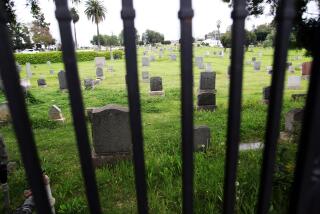Cohabitant’s Loss at Issue in Court Case
- Share via
SAN FRANCISCO — The state Supreme Court agreed Thursday to decide whether a man whose live-in lover was killed in a car accident can sue for loss of companionship as if the couple had been married.
The case stems from a December, 1982, accident in Pasadena in which a car driven by Robert Louis Sheldon broadsided the car in which Richard C. Elder and his partner, Linda Maria Ebeling, were riding.
Elder watched as Ebeling was thrown from the car. She died later at a hospital. Although he was able to collect damages for the injuries he sustained, he also sued Sheldon for additional damages for loss of consortium with Ebeling and emotional distress. But after a Superior Court judge ruled that he could not press those claims, he appealed.
A state Court of Appeal in Los Angeles ruled against Elder, concluding earlier this year that “marriage is that fine, bright line by which the strength of a relationship may be tested.”
Difficult to Decide
The appellate court said judges would find it difficult to decide what constitutes a stable relationship, and thus one in which one of the partners could collect damages when the other died.
“As we see it,” Court of Appeal Justice Lynn D. Compton wrote in the opinion, “marriage is the only dependable means by which a relationship may be legally defined for purposes of determining loss of consortium.”
Compton’s ruling conflicted with a 1983 decision in another case by a state Court of Appeal in San Bernardino, which ruled that a cohabitant can sue if he can prove “a stable and significant” relationship possessing the characteristics of marriage.
Elder’s lawyers argued in their petition to the high court that while the law traditionally has granted married couples greater rights, the law should be flexible, and should be interpreted in a way “that permits it to flex with the future--merging the creative process of common law with the current realities of life.”
Chief Justice Rose Elizabeth Bird, along with Justices Otto Kaus, Allen Broussard, Joseph Grodin and Malcolm Lucas voted to hear the case. That was one vote more than the four votes needed to accept a case.
Rent Control Case
In a second case, the high court agreed to decide another challenge to Santa Monica’s rent control ordinance--whether a rent control board can assess fines of $500 and impose jail of up to six months against landlords who violate provisions of the city’s rent control ordinance.
Santa Monica landlord Haidy McHugh and other landlords are challenging as unconstitutional the rent control board’s authority to impose fines and other sanctions, arguing that only courts have the power to impose such penalties.
More to Read
Sign up for Essential California
The most important California stories and recommendations in your inbox every morning.
You may occasionally receive promotional content from the Los Angeles Times.










